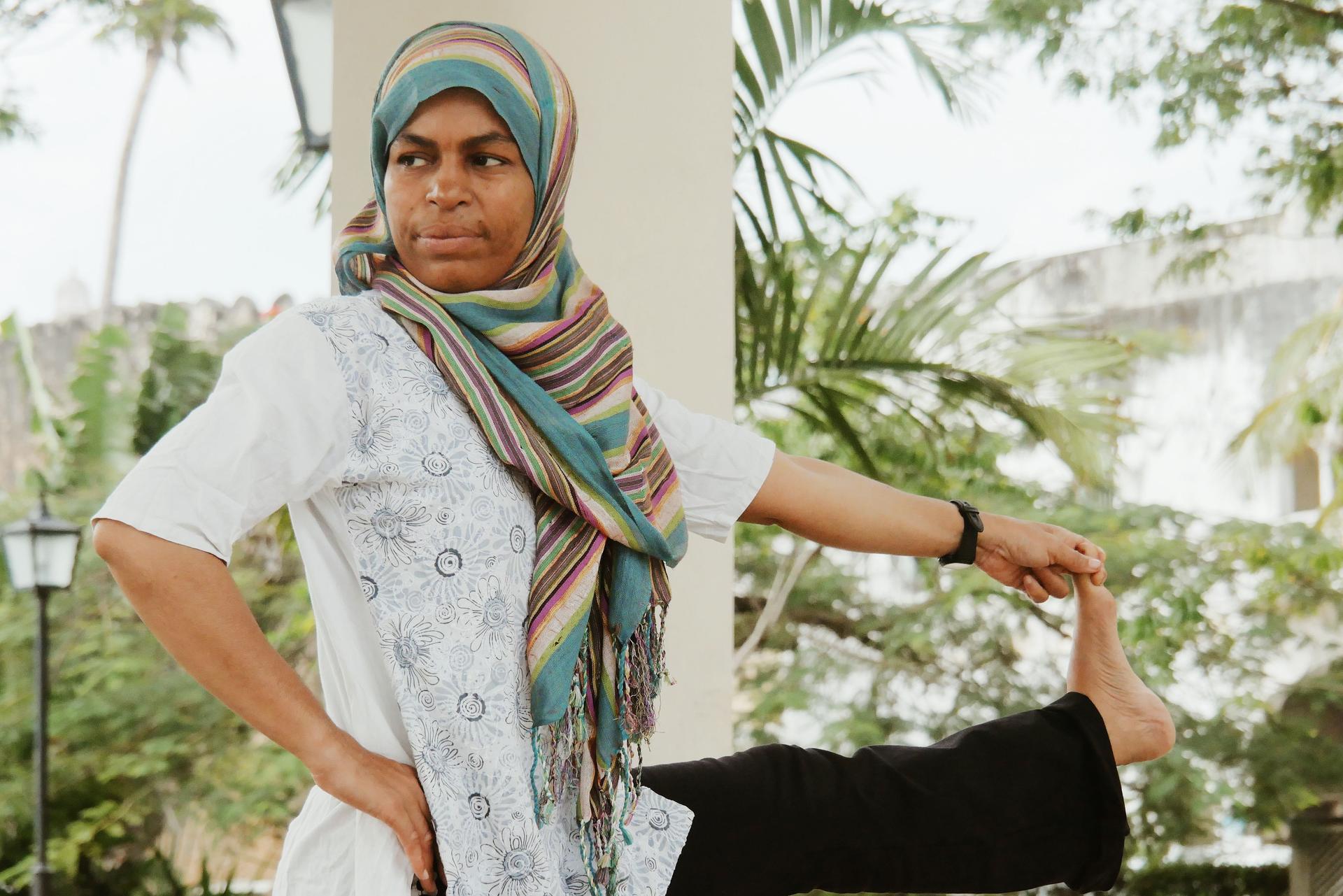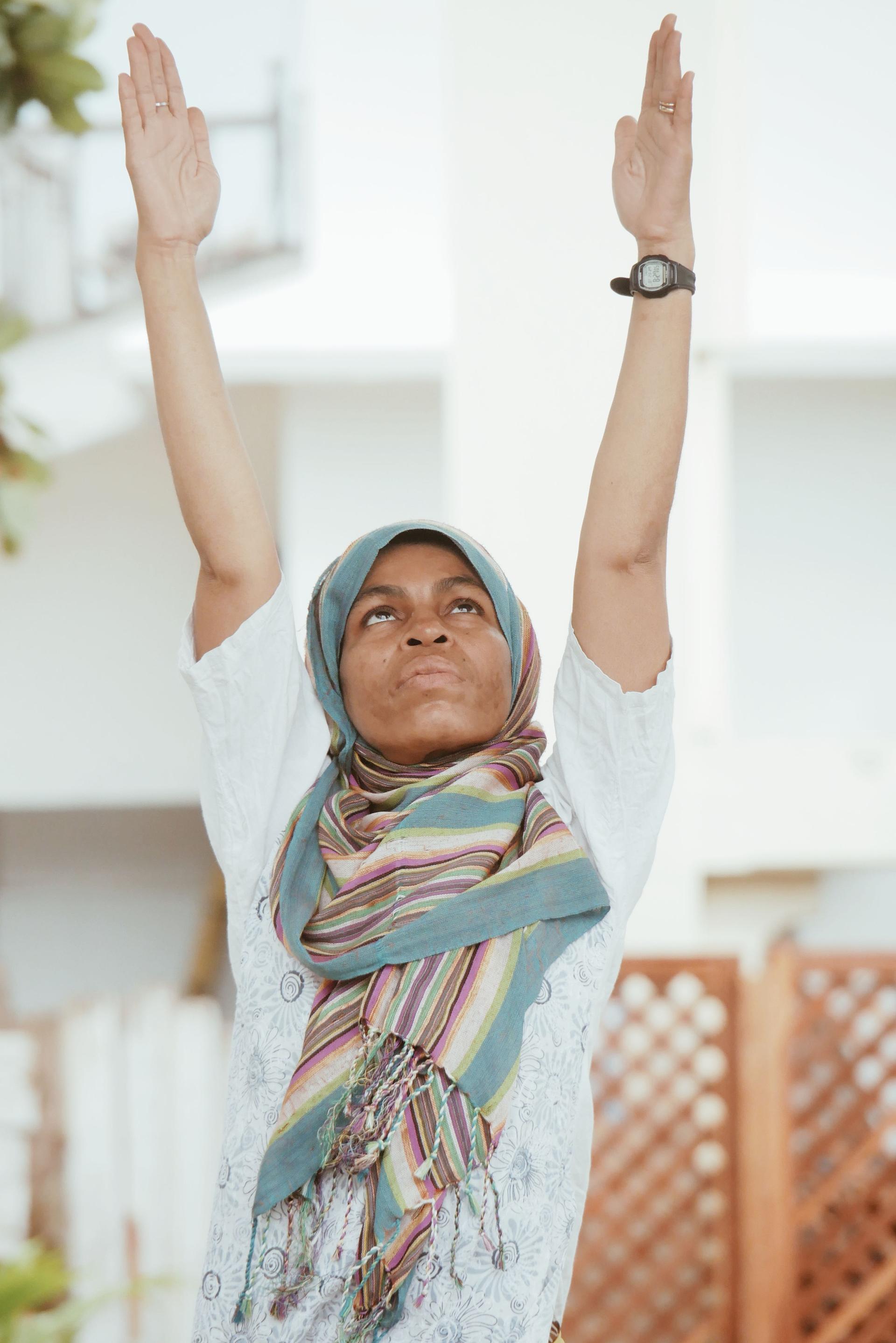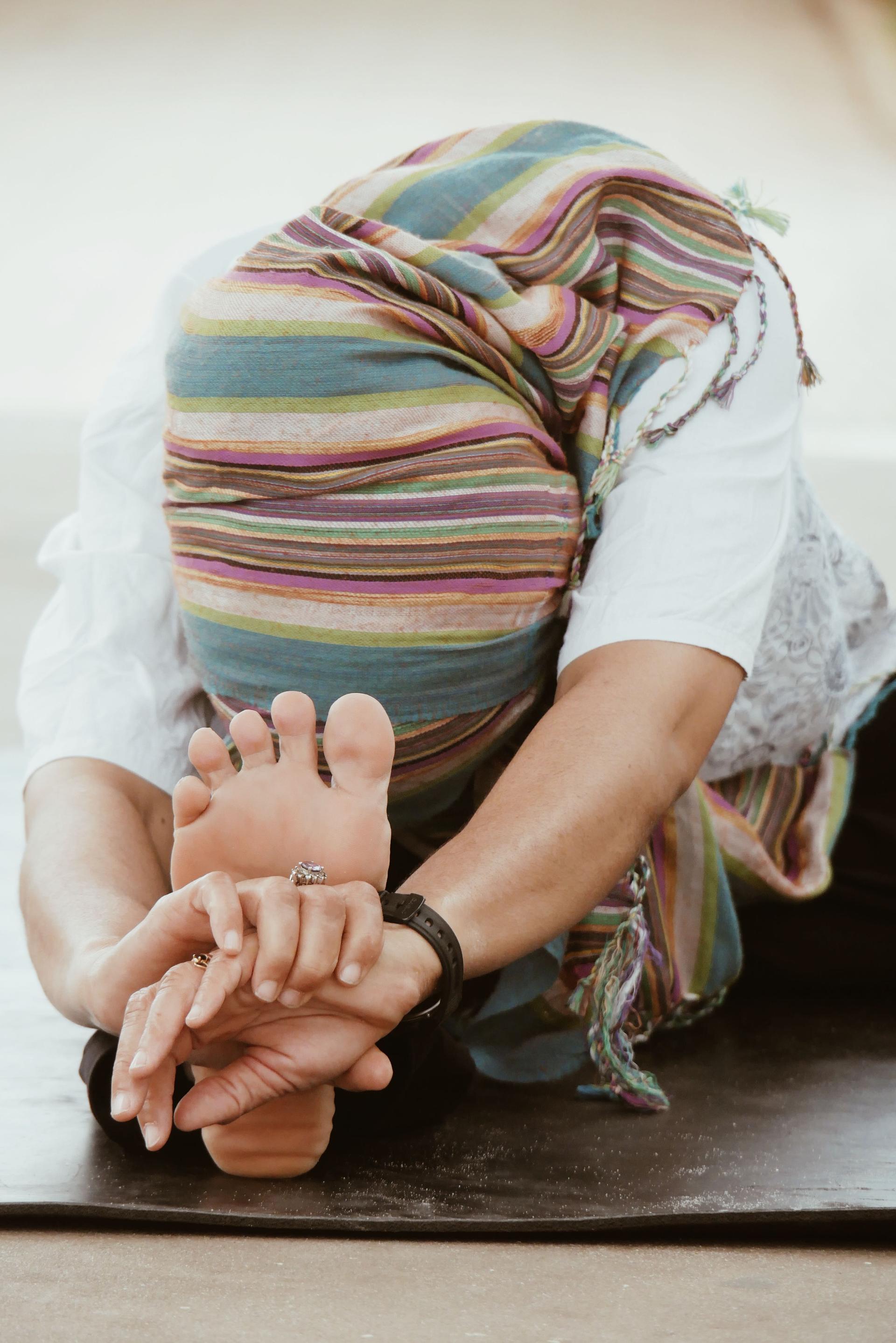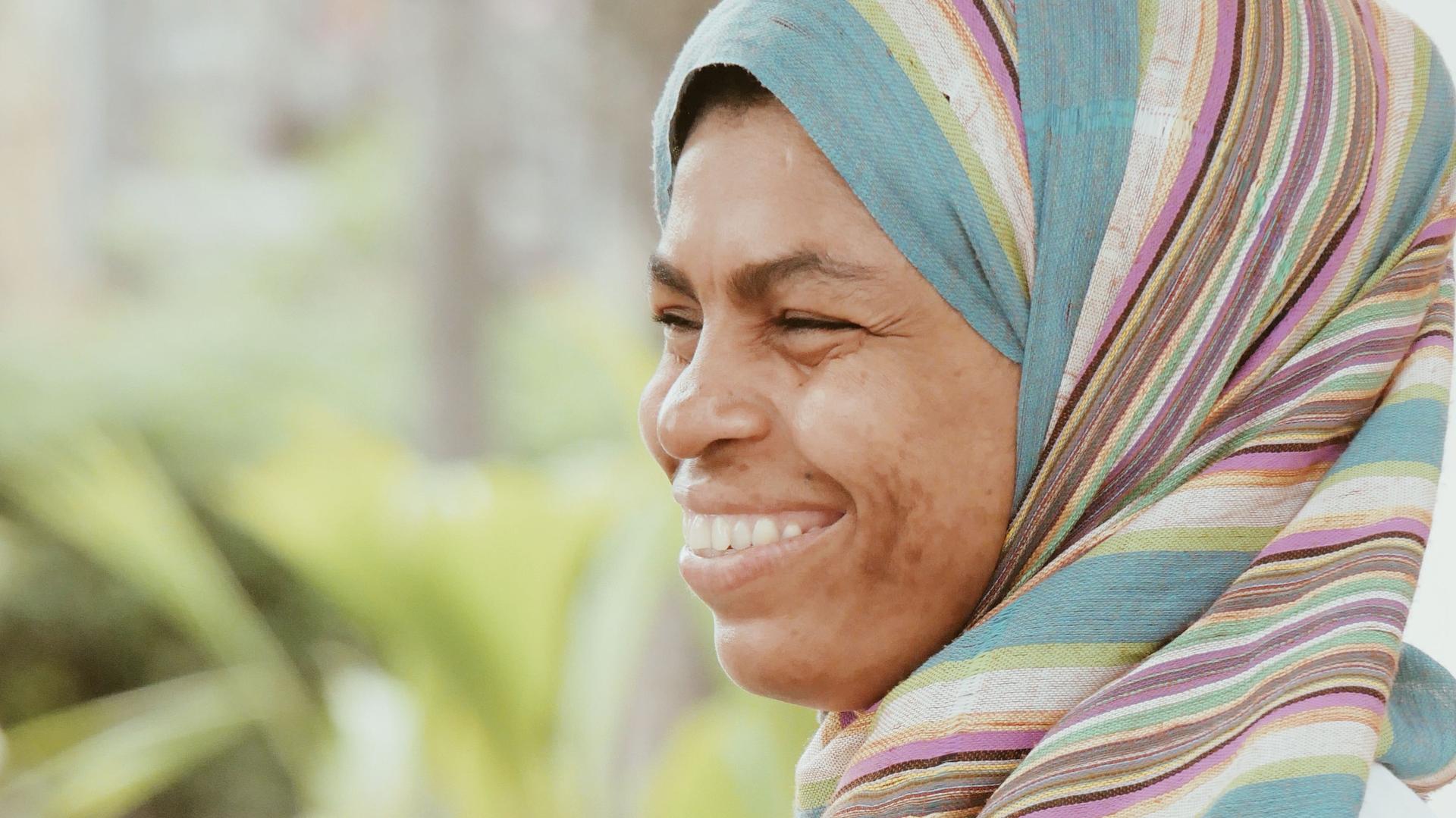A Zanzibar ‘divorce advocate’ says marriage is making women sick
As Zanzibar’s unofficial “divorce advocate,” Ayda Abdallah holds deep respect for the institution of marriage, yet she also believes that divorce can seriously improve a woman’s health — and possibly even save her life.
“Circulate each toe,” Ayda Abdallah said softly in Swahili while sitting cross-legged on her green yoga mat. “One by one, count to five and then circulate in the other direction.”
It’s a Wednesday morning in Stone Town, Zanzibar, and Abdallah is leading a free yoga class for women with disabilities. Only one woman is present today, and she is three months pregnant, so Abdallah consults her “Yoga for Pregnancy, Birth and Beyond” book and chooses slow, meditative poses focused on deep breathing and relaxation.
Abdallah has been practicing and teaching yoga for the last eight years, focusing her attention on women in crisis who struggle with their mental health. While teaching yoga at Kidongo Chekundu, Zanzibar’s central psychiatric hospital, she had a revelation: Many of the women in her workshops were not necessarily mentally ill. Instead, “it’s really marriage that makes them sick,” Abdallah said. As Zanzibar’s unofficial “divorce advocate,” she holds deep respect for the institution of marriage, yet she also believes that divorce can seriously improve a woman’s health — and possibly even save her life.
Related: Can entrepreneurship empower Zanzibar’s young women?
Abdallah’s own marriage crisis led her down a path of total transformation and reclamation of her mental health and well-being. Married before she had reached 21, Abdallah was determined not to repeat the trauma she experienced in childhood. Abdallah’s parents divorced when she was 2 years old, and when her mother remarried, years of discord at home ensued. She witnessed her mother and stepfather struggle and said to herself: “I’m not going down that road.”

As a young couple “[it] was hard but we had a good life,” Abdallah reminisced. “We had no money but I was the happiest woman in the world. We were really friends who talked about everything. We planned everything together. We joked, and we laughed.”
By the age of 25, life bloomed as her husband landed a good job, they bought a house and Abdallah gave birth to her son. The couple acquired properties and more savings, but Abdallah felt her husband’s personality began to change. “He became bossy. I became distant. We never had time to talk. I realized that I lost my friend, and the whole marriage became meaningless.” At first, Abdallah saw herself as a victim and blamed herself for their challenges. “I thought, ‘Maybe I’m not a good wife.’ Everything that went wrong, I thought it was me.”
Nuru Mwalim Hamis, a 32-year-old social worker from the Zanzibar Association of Social Workers (ZASWA) who works as an officer in the Women’s Department, has taken on at least 25 social work cases of women in distress through the Zanzibar Child Rights Center (ZCRC) since January 2018. The ZCRC was founded recently through a partnership with Save the Children in Zanzibar to strengthen child rights and child protection and offer free counseling services to Zanzibar’s most vulnerable women and children. Hamis has worked with many women in stressful marriages, including ones who have gone deaf or lost their sight to severe beatings, or report experiencing fear, coercion or intimidation within the marriage.

Abdallah insists that her relationship never turned physically violent but that it became increasingly more stressful to stay married. According to the United Nations Children’s Emergency Fund (UNICEF)’s National Plan of Action to End Violence Against Women and Children 2017-2022, “over two thirds of women ever married report some degree of marital control.” The study also states that “significant numbers of women report being excluded from household decision-making including decisions related to their own health.” For others, “violence against women is reported to be normalized within [Zanzibar’s] social norms and practices.”
The report reveals that over one-third of men and women both agree that “wife-beating by a husband is justified in specific situations like burning the food, arguing with him, going out without telling him or neglecting children.”
Sitting in her airy office at the ZCRC, Hamis said “divorce [in Zanzibar] is a very difficult situation. First, it’s difficult for a woman to return to her family home once she’s married. If there are conflicts in the marriage, she is told to endure, to be patient, and at the end of the day, she grows extremely frustrated.” As a counselor, her primary goal is to help women return to a clear mental state where they can make informed decisions. She and her team follow the laws and customs of Islam to guide the counseling process and promote reconciliation whenever possible.
“When there’s strain in a marriage, we do what we can to save [it]. Meetings are held with the extended family on both sides to solve the conflict. If there’s a major issue, the sheha [a government-appointed local community leader] intervenes to hear the grievance. If the husband refuses to attend these sessions, we may have no choice but to call the police or advise a separation. We want to solve our problems peacefully, but sometimes it’s necessary for an intervention.”
As stress inside Abdallah’s marriage heightened, she reached out to her husband’s family for support.
“Like everybody else, I tried to talk through our issues,” according to Swahili culture and tradition informed by the laws of Islam. Looking back, “this wasn’t really helpful at all,” she said.
Abdallah began having inexplicable seizures and her health faltered. “Many people thought I was possessed. My mother thought I was mentally ill. My husband advised me to ‘pray, pray, pray.’” Abdallah reached a breaking point, asking her husband point-blank: “Can we fix this, or should you hold the nail and I hold the hammer?”
Six months later, she said, “Now, I’m holding the hammer,” and walked away from the 14-year marriage.
Lawyer Jamila Juma, director of Zanzibar Association for Female Lawyers (ZAFELA), from behind her desk, pointed to patriarchy as a primary source of conflict. “[In Zanzibar] we follow Islamic law. The Quran teaches us to begin — and end — every relationship in peace. But many times, the courts favor men out of pure patriarchy, and women and children suffer to get their basic rights.”
As written in the Quran in Chapter 2, Verse 231:
“If you divorce women, and they reach their appointed term, hold them back in amity or let them go in amity. Do not hold them back out of malice, to be vindictive. Whoso does this does himself injustice.”
Yet, divorce deliberation is often delayed because the Quran also instructs two waiting periods of three months each before a divorce is final, at the husband’s discretion.
In 2017, at least 1,218 divorce cases were tried in kadi religious courts, where all matters of asset distribution, inheritance and child custody are determined. While the number of divorce cases fluctuates, Juma still sees a crisis in terms of women’s rights. “A man thinks if he gives a woman food, shelter and clothing, this is enough. But this is not enough. Marriage doesn’t give a man the right to keep a woman inside [the house]. She also needs peace, love and faith. A woman will hesitate to separate because she wonders how she will get her basic needs met,” Juma explained. According to the National Plan of Action to End Violence Against Women and Children, 73 percent of married women earn less than their husbands.
The Kadhi Court Act, passed by the Zanzibar House of Representatives in September of 2017, finally recognized and measured a woman’s “emotional labor” as “hidden contributions” within a marriage.
“There are all sorts of ways a woman contributes to a marriage but it was rarely recognized by the courts,” Juma explained. “Women share their ideas; they take [care] of the children; they are the foundation of a family’s survival. This needs to be evaluated in court.”
At the ZCRC, social worker Hamis emphasizes the need for more supportive services for women in crisis and recently entered into a partnership with the Zanzibar Imams Association to implement three-month marriage education courses to learn about the meaning of marriage. She and her team are also working with kadi court officials to secure an official spot where ZASWA social workers can offer free counseling and advice to distressed women. In her view, “The difference between feeling like you’re a princess or you want to die tomorrow depends on the man who marries you.”
At the age of 35, gripped with fear and self-doubt, Abdallah moved home with her mother and son and says it took her nearly two years to recover from the divorce. “At first, I saw myself as a victim,” she recalled. She traveled two hours by ferry to Dar es Salaam to seek advice from doctors. “My stress was high on the mountain. A doctor asked me, ‘Do you remember what happens right before you have a seizure?’ I realized that every time I had [a seizure], my ex-husband was there.’” The doctor helped Abdallah connect the dots between the seizures and extreme anxiety, prescribing her plenty of rest and exercise.
Around this time, Abdallah threw herself into work with Sasik, a women’s embroidery collective based in Stone Town. As a part of Sasik, Abdallah surrounded herself with women going through troubles of their own. It was then that she met Bev, a British friend who first introduced Abdallah to a visiting yoga teacher. “It was really funny at first. I could barely touch my toes; I held my breath and was totally inflexible. I looked at the teacher and thought, ‘Who is that?’” As she began a home practice, however, Abdallah became more flexible and most importantly, she discovered that she was having fewer seizures.

Her time on the mat led to a renewed commitment to healing, health and wellness; she signed up for courses with Africa Yoga Project in Nairobi, Kenya, and eventually set up a practice as a certified yoga instructor in Zanzibar. As a Muslim, Abdallah takes pleasure in the parallels between yoga poses and Islam’s five essential prayer poses. After her Wednesday morning class, Abdallah relaxes on a bench and briefly explains how Tadasana (mountain pose) is like Akbir or al-Qayyim (the opening prayer poses). Ardha Uttanasana (halfway lift) is similar to Ruku (bowing in prayer). Balasana (child’s pose) is similar to Sujuda (to lie prostrate).
There’s a spiritual charge to Abdallah’s practice, recognizing how one’s health is directly linked to harmony between the mind and body. “It was on the mat that I realized there are so many women who are afraid to step out of the marriage out of fear, out of shame, or they have no choice.”
On and off the mat, Abdallah proudly lives her life as an advocate for women. On any given day, Abdallah has her head in a yoga book or is reading about a new superfood discovery, and is known to her wide circle of friends, colleagues and neighbors as a deep listener with sound advice. You could call her a “divorce advocate,” she said, laughing. “But it’s not that I’m blaming my community. We have a beautiful culture. But we can also adjust our lives and make it clear that women do not have to be victims, and we don’t have to live in shame.”
Amanda Leigh Lichtenstein reported from Zanzibar.
Our coverage reaches millions each week, but only a small fraction of listeners contribute to sustain our program. We still need 224 more people to donate $100 or $10/monthly to unlock our $67,000 match. Will you help us get there today?
